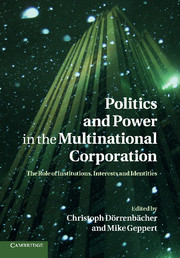 Politics and Power in the Multinational Corporation
Politics and Power in the Multinational Corporation Published online by Cambridge University Press: 26 April 2011
Introduction
The objective of this chapter is to provide a critical overview over recent theory-based research on multinational corporations (MNC) conflict. In particular, we seek to understand and explicate the contributions of the various theoretical approaches and perspectives applied in international business (IB) research towards the analysis of conflictual situations and processes in MNC contexts. In modeling conflict in MNC international business, authors draw on diverse theoretical traditions, including psychology, sociology and economics as well as organizational conflict theory. We wish to critically fathom their respective potential for the description and explanation of MNC conflict and, in addition, provide some insights into the theoretical lacunae remaining within the IB conflict research: where and how can we better integrate and extend conflict research in the IB field in order to fully capitalize on the theoretical advancements in conflict research at large? And where do we need to adjust concepts and constructs drawn from related fields to better account for the complex context of MNC conflicts? For reasons expounded upon below, the critical review concentrates on conflicts arising in the MNC headquarters–subsidiary relationship.
Since the MNC as an organization has become an object of study in its own right, it has been characterized as an inherently conflictual arena (Bartlett and Ghoshal 1989; Doz and Prahalad 1991; Gladwin and Walter 1980; Pahl and Roth 1993; Prahalad and Doz 1987).
To save this book to your Kindle, first ensure [email protected] is added to your Approved Personal Document E-mail List under your Personal Document Settings on the Manage Your Content and Devices page of your Amazon account. Then enter the ‘name’ part of your Kindle email address below. Find out more about saving to your Kindle.
Note you can select to save to either the @free.kindle.com or @kindle.com variations. ‘@free.kindle.com’ emails are free but can only be saved to your device when it is connected to wi-fi. ‘@kindle.com’ emails can be delivered even when you are not connected to wi-fi, but note that service fees apply.
Find out more about the Kindle Personal Document Service.
To save content items to your account, please confirm that you agree to abide by our usage policies. If this is the first time you use this feature, you will be asked to authorise Cambridge Core to connect with your account. Find out more about saving content to Dropbox.
To save content items to your account, please confirm that you agree to abide by our usage policies. If this is the first time you use this feature, you will be asked to authorise Cambridge Core to connect with your account. Find out more about saving content to Google Drive.